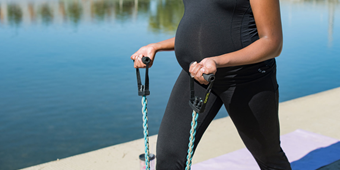Should You Bank on Cord Blood for Your Baby?

Find Your Perfect Match
Answer a few questions and we'll provide you with a list of primary care providers that best fit your needs.
If you’re pregnant, you may be considering cord blood banking. That is, saving the blood from your baby's umbilical cord.
Is this a good choice for you? Following is information to consider. Even if you don’t feel the need to save your baby’s cord blood for your own family’s use, donating the blood could help save another child’s life.
What Is Cord Blood?
Cord blood is blood that remains in the umbilical cord and placenta after birth. It's a rich source of stem cells that can be used to treat some diseases. Stem cells have the unique ability to grow into many types of cells in the body. These cells are also the basis of our immune system and can be used to treat children with potentially fatal diseases.
Collecting cord blood is simple, safe and painless to mother and baby.
Why Preserve Cord Blood?
Some parents see banking a baby’s cord blood as a type of insurance. Consider these reasons:
- Helping your baby: The blood cells are a perfect genetic match for your baby and might help him survive a serious illness like cancer or an immune system disorder.
- Helping your family: Stem cells from your baby’s cord blood may effectively treat some diseases of a parent or sibling. For example, if you already have a child with a serious medical condition that could be helped by a cord blood transplant, you might want to consider banking your new baby’s cord blood.
- Helping another family’s child: Even if you don’t plan to store blood for your baby’s use, you may want to consider donating to a public blood bank. Your baby’s cord blood could be a life-saving resource for another family whose child is seriously ill.
How Is Cord Blood Collected?
Collecting cord blood is simple, safe and painless to mother and baby. After the baby is born, the umbilical cord is cut and clamped. Blood can be collected in one of two ways:
- Syringe method: A syringe is used to draw blood from the umbilical cord shortly after the cord has been cut.
- Bag method: The umbilical cord is elevated to drain the blood into a bag.
Both methods take only a few minutes, and do not interfere with delivery, whether vaginal or cesarean. If you’re considering banking your baby’s cord blood, ask your doctor if your hospital is set up to collect cord blood, and if there is a fee.
How Is Cord Blood Preserved?

After the blood is collected, it’s sent to a facility — known as a blood bank — where it will be processed and then frozen. You have two options for storing cord blood. Each has its pros and cons:
- Private banking: Storing cord blood in a private bank means that the cord blood is available to your family only. This can be expensive, as you will be charged initial and ongoing storage fees. You may also want to ask what happens to the banked cord blood if the facility goes out of business.
- Public banking: Just like a blood bank, your baby’s stored cord blood is available to other children who are biological matches. Storing cord blood in a public bank is free. And cord blood from public banks is used far more often in medical procedures than privately banked blood.
If you decide to store your baby’s cord blood, make sure the blood bank is accredited by the American Association of Blood Banks (AABB).
How Much Does Cord Blood Banking Cost?
Typically, if you choose a private blood bank, two fees are involved:
- Initial fee: Covers enrollment, collection and storage for at least the first year. Depending on the storage time, this fee can range from $900 to more than $2,000.
- Annual storage fee: Approximately $100 a year. Your blood bank may offer a prepaid plan at a discount, plus payment plans to make this a workable option.
Find Your Perfect Match
Answer a few questions and we'll provide you with a list of primary care providers that best fit your needs.
Source: American Pregnancy Association, 09/12/2016; American Congress of Obstetrics and Gynecology,02/2016; American Academy of Pediatrics, 10/30/2017




